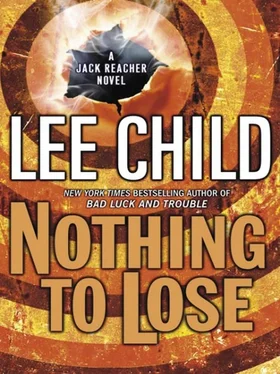
Lee Child
Nothing to Lose
A Jack Reacher Novel – #12
For Rae Helmsworth and Janine Wilson.
They know why.
The sun was only half as hot as he had known sun to be, but it was hot enough to keep him confused and dizzy. He was very weak. He had not eaten for seventy-two hours, or taken water for forty-eight.
Not weak. He was dying, and he knew it.
The images in his mind showed things drifting away. A rowboat caught in a river current, straining against a rotted rope, pulling, tugging, breaking free. His viewpoint was that of a small boy in the boat, sitting low, staring back helplessly at the bank as the dock grew smaller.
Or an airship swinging gently on a breeze, somehow breaking free of its mast, floating up and away, slowly, the boy inside seeing tiny urgent figures on the ground, waving, staring, their faces tilted upward in concern.
Then the images faded, because now words seemed more important than pictures, which was absurd, because he had never been interested in words before. But before he died he wanted to know which words were his. Which applied to him? Was he a man or a boy? He had been described both ways. Be a man, some had said. Others had been insistent: The boy’s not to blame. He was old enough to vote and kill and die, which made him a man. He was too young to drink, even beer, which made him a boy. Was he brave, or a coward? He had been called both things. He had been called unhinged, disturbed, deranged, unbalanced, delusional, traumatized, all of which he understood and accepted, except unhinged. Was he supposed to be hinged ? Like a door? Maybe people were doors. Maybe things passed through them. Maybe they banged in the wind. He considered the question for a long moment and then he batted the air in frustration. He was babbling like a teenager in love with weed.
Which is exactly all he had been, a year and a half before.
He fell to his knees. The sand was only half as hot as he had known sand to be, but it was hot enough to ease his chill. He fell facedown, exhausted, finally spent. He knew as certainly as he had ever known anything that if he closed his eyes he would never open them again.
But he was very tired.
So very, very tired.
More tired than a man or a boy had ever been.
He closed his eyes.
The line between Hope and Despair was exactly that: a line, in the road, formed where one town’s blacktop finished and the other’s started. Hope’s highway department had used thick dark asphalt rolled smooth. Despair had a smaller municipal budget. That was clear. They had top-dressed a lumpy roadbed with hot tar and dumped gray gravel on it. Where the two surfaces met there was an inch-wide trench of no-man’s-land filled with a black rubbery compound. An expansion joint. A boundary. A line. Jack Reacher stepped over it midstride and kept on walking. He paid it no attention at all.
But he remembered it later. Later, he was able to recall it in great detail.
Hope and Despair were both in Colorado. Reacher was in Colorado because two days previously he had been in Kansas, and Colorado was next to Kansas. He was making his way west and south. He had been in Calais, Maine, and had taken it into his head to cross the continent diagonally, all the way to San Diego in California. Calais was the last major place in the Northeast, San Diego was the last major place in the Southwest. One extreme to the other. The Atlantic to the Pacific, cool and damp to hot and dry. He took buses where there were any and hitched rides where there weren’t. Where he couldn’t find rides, he walked. He had arrived in Hope in the front passenger seat of a bottle-green Mercury Grand Marquis driven by a retired button salesman. He was on his way out of Hope on foot because that morning there had been no traffic heading west toward Despair.
He remembered that fact later, too. And wondered why he hadn’t wondered why.
In terms of his grand diagonal design, he was slightly off course. Ideally he should have been angling directly southwest into New Mexico. But he wasn’t a stickler for plans, and the Grand Marquis had been a comfortable car, and the old guy had been fixed on Hope because he had three grandchildren to see there, before heading onward to Denver to see four more. Reacher had listened patiently to the old guy’s family tales and had figured that a saw-tooth itinerary first west and then south was entirely acceptable. Maybe two sides of a triangle would be more entertaining than one. And then in Hope he had looked at a map and seen Despair seventeen miles farther west and had been unable to resist the detour. Once or twice in his life he had made the same trip metaphorically. Now he figured he should make it for real, since the opportunity was right there in front of him.
He remembered that whim later, too.
The road between the two towns was a straight two-lane. It rose very gently as it headed west. Nothing dramatic. The part of eastern Colorado that Reacher was in was pretty flat. Like Kansas. But the Rockies were visible up ahead, blue and massive and hazy. They looked very close. Then suddenly they didn’t. Reacher breasted a slight rise and stopped dead and understood why one town was called Hope and the other Despair. Settlers and homesteaders struggling west a hundred and fifty years before him would have stopped over in what came to be called Hope and would have seen their last great obstacle seemingly within touching distance. Then after a day’s or a week’s or a month’s repose they would have moved on again and breasted the same slight rise and seen that the Rockies’ apparent proximity had been nothing more than a cruel trick of topography. An optical illusion. A trick of the light. From the top of the rise the great barrier seemed once again remote, even unreachably distant, across hundreds more miles of endless plains. Maybe thousands more miles, although that too was an illusion. Reacher figured that in truth the first significant peaks were about two hundred miles away. A long month’s hard trekking on foot and in mule-drawn carts, across featureless wilderness and along occasional decades-old wheel ruts. Maybe six weeks’ hard trekking, in the wrong season. In context, not a disaster, but certainly a bitter disappointment, a blow hard enough to drive the anxious and the impatient from hope to despair in the time between one glance at the horizon and the next.
Reacher stepped off Despair’s gritty road and walked through crusted sandy earth to a table rock the size of a car. He levered himself up and lay down with his hands behind his head and stared up at the sky. It was pale blue and laced with long high feathery clouds that might once have been vapor trails from coast-to-coast red-eye planes. Back when he smoked he might have lit a cigarette to pass the time. But he didn’t smoke anymore. Smoking implied carrying at least a pack and a book of matches, and Reacher had long ago quit carrying things he didn’t need. There was nothing in his pockets except paper money and an expired passport and an ATM card and a clip-together toothbrush. There was nothing waiting for him anywhere else, either. No storage unit in a distant city, nothing stashed with friends. He owned the things in his pockets and the clothes on his back and the shoes on his feet. That was all, and that was enough. Everything he needed, and nothing he didn’t.
He got to his feet and stood on tiptoe, high on the rock. Behind him to the east was a shallow bowl maybe ten miles in diameter with the town of Hope roughly in its center, eight or nine miles back, maybe ten blocks by six of brick-built buildings and an outlying clutter of houses and farms and barns and other structures made of wood and corrugated metal.
Читать дальше













